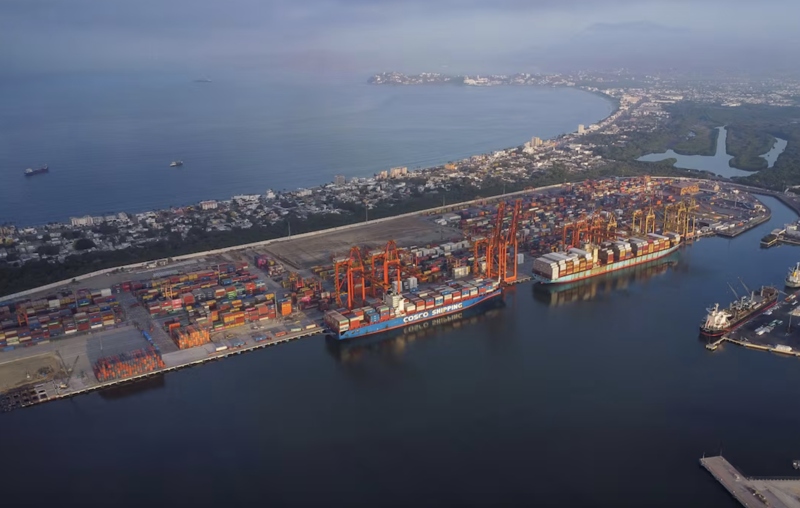China has a major influence in the port sector in Latin America.
Posted on: 26/06/2025

Manzanullo Port in Mexico - Photo: Reuters.
The US is increasingly concerned about the national security implications of Beijing's influence over critical infrastructure in Latin America, as Chinese companies have acquired a series of power plants, mines, telecommunications networks and ports in the region over the past two decades, according to the Financial Times.
Research conducted by the Center for Strategic and International Studies (CSIS) – and shared with the Financial Times ahead of publication – found that the number of ports with Chinese involvement in the region from Mexico to Chile is more than double what US researchers had previously reported.
The CSIS data includes seven active ports operated by Hong Kong-based CK Hutchison. CSIS researchers also found four other port projects involving Chinese companies have been cancelled and two more are currently inactive.
The Trump administration has repeatedly spoken out about the risks it sees as posed by Chinese control of ports at both ends of the Panama Canal. CK Hutchison subsequently agreed to sell its global port operations to subsidiaries of U.S. investment giant BlackRock and Geneva-based Mediterranean Shipping Company (MSC).
But CSIS said its research found that ports in Jamaica and Mexico posed greater risks to US national security when scored on metrics including the volume of US commercial cargo passing through those ports, US naval activity and proximity to US military facilities or strategic choke points.
“The riskiest port in the Western Hemisphere is Kingston, Jamaica,” said Henry Ziemer of CSIS, who led the study. “It handles a huge amount of commercial cargo, is located in a country that is a strategic ally of the United States, and is controlled by China Merchants Port, a Chinese state-owned enterprise.”
CSIS rates the Mexican ports of Manzanillo and Veracruz, both operated by CK Hutchison, as the next biggest risks to US security. “The US relies heavily on trade with these ports. If Manzanillo were to be shut down, the US economy would lose $134 million a day and in the case of Veracruz, $63 million a day,” Ziemer said.
Concerns center on the possibility that China could use the ports to disrupt U.S. commerce, deny U.S. warships access in the event of a conflict between Washington and Beijing, or resupply its own naval vessels. The CSIS study assessed the extent of U.S. trade and security interests at each port and also looked at the extent of China’s influence over each.
Evan Ellis, a professor of Latin American studies at the US Army War College, said each Chinese port company has a commercial reason for its involvement in ports in the region, but Beijing sees “strategic advantage” in such involvement. “There is a broader strategy here. China wants food security and energy security… So they want access to these ports,” Ellis said.
China has rejected US claims that CK Hutchison’s activities in the Panama Canal give it influence that could undermine US security. China’s foreign ministry said in April that Washington was “spreading disinformation and stirring up trouble” to find an excuse to “attempt to control the canal” of Panama.
But both Mr Ellis and Mr Ziemer noted that Beijing had expressed displeasure at CK Hutchison’s proposed global port business to BlackRock and MSC. Ta Kung Pao, a Beijing-backed newspaper in Hong Kong, accused CK Hutchison of “cowardice” and “betrayal.” China’s antitrust regulator has ordered a review of the deal.
“China’s own rhetoric about the Hutchison deal shows how important it is to control ports. Ports also provide Beijing with a huge amount of information about cargo movements,” Ziemer said.